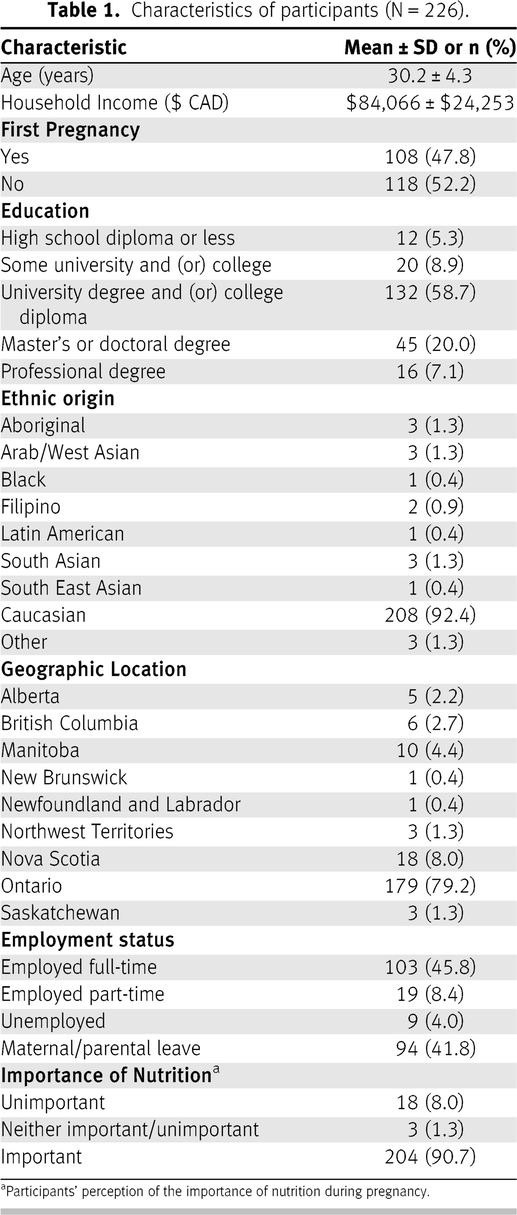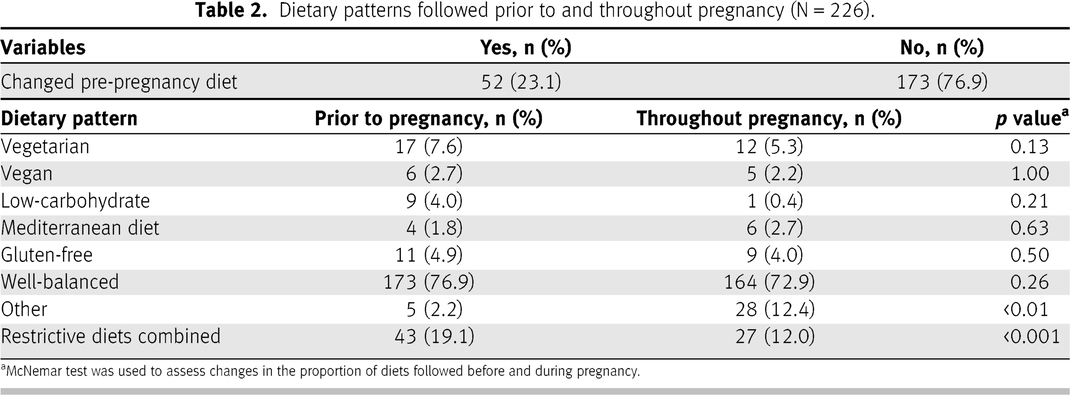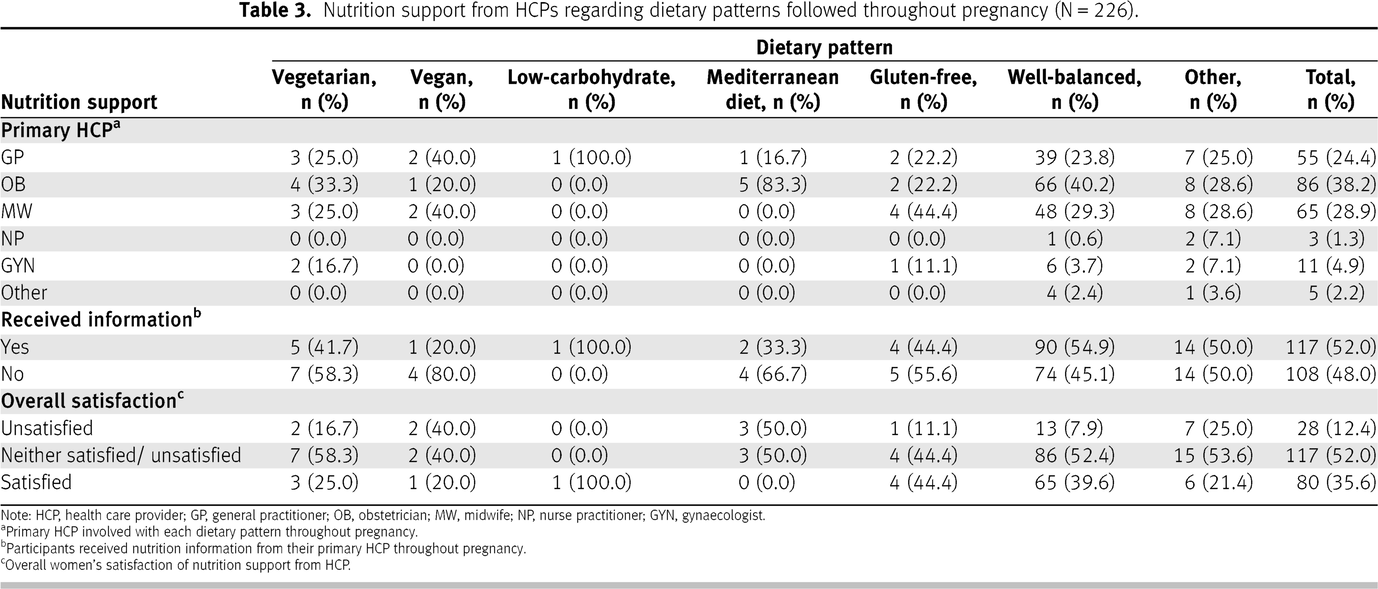INTRODUCTION
The dietary choices women make prior to and throughout pregnancy can impact maternal health and fetal development [
1–
4]. While certain foods are recommended to be avoided during pregnancy to reduce the risk of food poisoning (e.g., raw or lightly cooked eggs, raw seafood) [
5], following dietary patterns that are restrictive can result in nutritional deficiencies and potential adverse birth outcomes [
4,
6]. Restrictive dietary patterns can include diets that omit or limit the consumption of certain foods. Examples of these dietary patterns include vegan or vegetarian, which limit the intake of animal products [
7]; low-carbohydrate, which restricts carbohydrates to varying degrees [
8]; or gluten-free, which excludes gluten, the protein found in rye, barley, and wheat [
9]. Improperly following restrictive dietary patterns prior to and throughout pregnancy can lead to a lower intake of essential nutrients for fertility, gestation, critical fetal development, and can significantly impact pregnancy outcomes [
8,
10–
13]. If the fetus is not well nourished it can program itself to re-allocate nutrients for development, such as an increased apportionment to brain growth and a reduction to tissue repair, that can lead to an increased risk of developing chronic diseases in adulthood, such as coronary heart disease, type 2 diabetes, and hypertension [
14–
16].
The vegan, vegetarian, low-carbohydrate, and gluten-free dietary patterns are current trending diets [
17,
18]. More than 6.4 million Canadians adhere to a dietary pattern that restricts the intake of meat products, such as veganism or vegetarianism [
19], approximately 10 million Canadians are consumers of gluten-free items [
20], and the longstanding popularity and variations of the low-carbohydrate diet (e.g., Atkins, ketogenic) demonstrates the ongoing societal interest in this dietary pattern [
21]. Expectant mothers consuming plant-based diets are at risk of developing deficiencies in vitamins B
12, D, iron, zinc, calcium, and (or) iodine [
11]. Consumers of the gluten-free diet are at risk for insufficient intakes of vitamin B
12, folate, iron, and (or) zinc [
13]. The nutrient deficiencies that may result from low-carbohydrate diets include iron [
22] and (or) folate [
22,
23]. More restrictive lower-carbohydrate diets can cause a reduction in maternal glucose levels, the preferred energy substrate for fetal development [
8,
24]. The nutrient deficiencies outlined above can result in adverse birth and health outcomes including increased risk for small for gestational age [
25], pre-eclampsia, and higher risk for autoimmune diseases [
26].
A less restrictive dietary pattern that has gained interest as being beneficial during pregnancy is the Mediterranean diet [
27,
28]. This diet, which has been modified for pregnancy with the omission of red wine recommendations, is rich in fruits, vegetables, unrefined cereals, nuts, seeds, olive oil, whole grains, and legumes, with a limited intake of dairy and poultry, and a rare consumption of red meat [
29]. The Mediterranean diet also includes moderate to high consumption of fish, although some fish are not recommended in high consumption for pregnant women, such as bigeye tuna (found in sushi), swordfish, and king mackerel [
30]. The nutrient composition of the Mediterranean diet increases the likelihood that an expectant mother will consume essential nutrients, such as vitamin B
12 and zinc, both of which are important for fetal neurological development [
11]. The Mediterranean diet has been found to be protective against many adverse outcomes including premature birth, cardiometabolic and congenital defects, gestational diabetes mellitus, and pre-eclampsia [
29].
Health care providers (HCPs) are often relied upon for nutrition advice and support [
31,
32]. However, the time HCPs spend on prenatal nutrition in Canada is limited, and some HCPs have reported a lack of training in providing nutrition counseling [
33]. The objectives of this study were to estimate the percentage of a sample of pregnant women in Canada following a vegan, vegetarian, low-carbohydrate, gluten-free, Mediterranean, or well-balanced diet prior to and throughout the gestational period and to explore if pregnant women received and were satisfied with the nutrition care recommendations from their HCPs.
Data collection
Data were collected through an anonymous, online survey developed on the Qualtrics platform (Qualitrics, Provo, Utah, USA 2015) and was completed by participants at the time of study recruitment (
Supplementary Figure 11). Implied consent was provided when participants submitted the survey. Prior to data collection, the 26-item original questionnaire was pretested on 10 Canadian women who had been pregnant 2–5 years prior to ensure clarity of survey questions. The survey asked questions about sociodemographic characteristics (e.g., age, ethnicity, education, employment status, annual household income, and geographical residence by province or territory), if women were primigravida or multigravida, nutrition information received by HCPs, and dietary patterns followed prior to and throughout pregnancy. Average annual household income was calculated based on the midpoint of 10 income categories provided in the survey (categories ranged from less than $20 000 to greater than $100 000, with $10 000 increments between categories).
Data on the dietary patterns were obtained from participants selecting the dietary pattern that best described their intake prior to and during pregnancy from the following list: vegan, vegetarian, low-carbohydrate, Mediterranean, gluten-free, I tried to eat a well-balanced diet, or other. Participants who selected the other category were encouraged to describe the diet followed in the provided text box. Changes in dietary patterns followed prior to and throughout pregnancy were first assessed by individual categories, to gain a better understanding of the overall dietary patterns followed by pregnant women. Changes in dietary patterns were then assessed by collapsing all restrictive dietary patterns (vegan, vegetarian, low-carbohydrate, and gluten-free) together and assessing the change in proportion of women following restrictive diets prior to and throughout pregnancy. Participants who indicated they changed their diet during pregnancy were asked if they were advised to follow their specific diet during their pregnancy, and if so why, from the following options: to manage weight gain, disease, food allergies, pregnancy discomforts, or for other reasons that they could specify.
Nutrition information received by pregnant women was collected by asking women which HCPs were primarily involved in their antenatal care and if nutrition information was provided by them. The overall satisfaction with the nutrition support received from HCPs and participants’ perception of the importance of nutrition during pregnancy were also explored. Maternal satisfaction was rated on a 5-point Likert scale ranging from very unsatisfied to very satisfied. The importance of nutrition was also rated on a 5-point Likert scale ranging from very unimportant to very important. The ordinal categories of maternal satisfaction and importance of nutrition were collapsed to 3-point scales for data analysis. For maternal satisfaction, the very unsatisfied and unsatisfied categories were collapsed into 1 category (unsatisfied), and very satisfied and satisfied into another (satisfied). For importance of nutrition, the very unimportant and unimportant categories were collapsed into 1 category (unimportant), and very important and important were collapsed into another (important). The mid-point of both scales (neither satisfied or unsatisfied, or neither important or unimportant) were left as is.
Statistical analysis
Quantitative data were analyzed using IBM SPSS Statistics, version 25.0 (IBM Corp., Armonk, NK, 2017). Survey questions measured on a continuous scale were summarized using the mean and standard deviation (SD), and categorical variables were reported with percentages. The McNemar test was used to evaluate the change in dietary patterns followed prior to and throughout pregnancy. A p-value < 0.05 was considered statistically significant. Qualitative responses from the “other” categories were independently analyzed for common themes by the study authors and a final list of themes was agreed on by all authors.
DISCUSSION
Most participants in this study were highly educated and reported following a well-balanced dietary pattern. Fifty-two women reported changing their diet after becoming pregnant, with most women switching to “other” dietary patterns for their pregnancy. Although 52.0% of participants received nutrition information from their HCP, two-thirds (64.4%) reported feeling “unsatisfied” or “neither satisfied or unsatisfied” with the nutrition information provided.
The proportion of women following vegan, vegetarian, and gluten-free diets are higher in this study than nationally reported data which found that 1.3% of Canadians follow a vegetarian diet [
34], 0.3% follow a vegan diet [
34], and 1.9% follow a gluten-free diet [
35]. In contrast, our data are similar to a 2020 study that surveyed 2566 youth and young adults in major Canadian cities and reported that 6.6% of participants followed a vegetarian diet and 2.5% followed a vegan diet [
36]. Other studies have found that highly educated women were more likely to consume a prenatal diet that met recommended pregnancy requirements and had a higher consumption of healthier dietary patterns that include fruits [
37], vegetables [
37], and whole grains [
38,
39]. Women with high educational attainment generally have more nutrition knowledge [
40] and high socioeconomic status groups disproportionately utilize new knowledge that emerges about health-risks and protective factors [
41]. It can be speculated that women with higher education are more aware of the relationship between nutrition, maternal health, and fetal development and are more apt to follow dietary patterns reflective of current prenatal nutrition recommendations.
Fewer women adhered to a restrictive dietary pattern throughout pregnancy compared with those following one prior to pregnancy. According to Lee et al. [
42] women are motivated to make dietary changes throughout the gestational period due to their realization that poor nutrition may have a negative impact on their baby. Pregnant women are particularly interested in healthy eating as they view their diet to be something they can control to protect their own and their baby’s health [
43]. It is possible that women in this study were knowledgeable about potential health risks of their restrictive diets, which prompted them to change to a more well-balanced diet during pregnancy and mitigate the risk of adverse birth outcomes.
Almost one-quarter of the women in the current study reported changing their diet after becoming pregnant, mostly due to the removal of recommended food items for food tolerance and healthy eating choices. These findings are similar to the Alberta Pregnancy Outcomes and Nutrition study (n = 379), where pregnant women reported making changes to their dietary intake for the health of the baby (64.9%), food aversions (26.4%), and nausea (22.7%) [
44]. Another study found factors such as nausea, food cravings, and heartburn to influence maternal dietary modifications throughout pregnancy [
45]. Although women may perceive adapting their diet to exclude certain recommended foods during pregnancy as a change in diet, it appears that most women do not change their overall diet, but instead, slightly adapt their food intake to accommodate their pregnancy-related needs.
Although 52.0% of women in the current study reported receiving nutrition information from their primary HCP, the majority who followed a restrictive dietary pattern throughout pregnancy, apart from the low-carbohydrate diet, received no nutrition information. HCPs report a lack of education and training in prenatal nutrition and find pregnant women who are vegan [
46], vegetarian [
46,
47], or have prior medical conditions [
42,
47] more challenging to nutritionally counsel. The lack of nutrition information provided to women following a restrictive dietary pattern is concerning because these dietary patterns, if improperly followed, can result in nutritional deficiencies which may impact gestational development [
11,
13]. Two-thirds of participants in the current study reported feeling neither satisfied or unsatisfied with the nutrition information provided by HCPs. In a study exploring prenatal nutrition care delivered by Family Health Teams and Community Health Centres in Ontario, HCPs reported spending little time on prenatal nutrition care [
33]. Similar findings were reported in an Australian study where HCPs described the nutrition advice they provided to pregnant women as brief [
42]. It is possible that low HCP knowledge and (or) limited time devoted to prenatal nutrition in antenatal appointments contributed to the overall lack of nutrition counseling and women’s low satisfaction with the counseling in the present study.
Strengths and limitations
This study is the first of its kind to investigate the self-identified dietary patterns followed by a select sample of Canadian women prior to and throughout pregnancy. Whereas other studies have assessed changes in maternal dietary intake by evaluating the inclusion or omission of individual foods and (or) food groups [
37–
39], the current study assessed whether women changed their entire dietary patterns once becoming pregnant. The present study also offers information on the level of nutrition support provided by HCPs, particularly with respect to each identifiable dietary pattern, as well as the overall satisfaction that participants felt towards the nutrition support delivered. These strengths aside, the data collected relied on participant self-reporting and may reflect reporting bias. Participants were also conveniently sampled and are not representative of all pregnant women in Canada. For example, the study sample had a higher median household income [
48], higher educational attainment, and was less diverse than the Canadian population [
49]. The data were collected on women who were currently pregnant or had been pregnant in the last year, thus it is possible that some women had to recall dietary patterns from over a year ago which may have resulted in recall bias. As the survey was available in English only, it may have also excluded Canadian pregnant women speaking other languages, particularly French. No participants were recruited from Quebec, which is the second largest province by population, representing approximately 22% of the Canadian population [
50]. Last, dietary patterns explored were open to participant interpretation, which may have resulted in inconsistent definitions between survey participants. Specifically, participants may have self-selected to follow a well-balanced diet even when following one of the other diet options, which may have overstated the responses in the well-balanced diet category. Similarly, it is possible for all other diet categories to be well-balanced in terms of nutritional intake. Future studies could provide more explicit definitions of each dietary pattern and include a larger, more representative sample to make findings more generalizable to the Canadian population.






